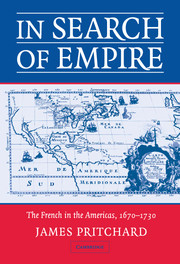Book contents
- Frontmatter
- Contents
- List of Illustrations
- List of Maps and Graphs
- List of Tables
- Preface
- Dates, Weights, Measures, and Currency
- List of Abbreviations
- Part I Colonies Formed
- 1 Colonial Populations
- 2 Settlements and Societies
- 3 Production
- 4 Trade and Exchange
- 5 Government and Politics
- Part 2 Colonies Defended
- Appendixes
- Bibliography
- Index
5 - Government and Politics
Published online by Cambridge University Press: 05 June 2012
- Frontmatter
- Contents
- List of Illustrations
- List of Maps and Graphs
- List of Tables
- Preface
- Dates, Weights, Measures, and Currency
- List of Abbreviations
- Part I Colonies Formed
- 1 Colonial Populations
- 2 Settlements and Societies
- 3 Production
- 4 Trade and Exchange
- 5 Government and Politics
- Part 2 Colonies Defended
- Appendixes
- Bibliography
- Index
Summary
INTRODUCTION
France's first overseas colonies appeared to depend on the state more than other European settlements, yet, owing to their demographic weakness, they were never successfully united into a centrally run, economically integrated empire. Colonial policy, metropolitan direction, and colonial government had much less formative impact on the development of French colonies than historians normally assert. The overseas authority of the early French state of Louis XIV and his successors was not well-developed, elaborate, or effective. The physical settings in which colonists found themselves, their settlements, forms of production and exchange, and the wars they fought to defend their possessions had greater effect on the evolution of French colonies in the Americas than the metropolitan government ever did. The question of government cannot be ignored, but neither does it deserve the attention it is traditionally accorded.
In September of 1663, Louis XIV revoked the charter of the Company of New France, reunited Canada to the French Crown, and the colony became a royal French province. The following year the King created a new charter company, and New France and the proprietary colonies in the West Indies were conceded to the West India Company. This move manifested the newly invigorated French state's search for a means to control and regulate the exploitation of its colonies rather than any reluctance to participate directly in the development of France overseas as did earlier grants to private companies.
- Type
- Chapter
- Information
- In Search of EmpireThe French in the Americas, 1670–1730, pp. 230 - 264Publisher: Cambridge University PressPrint publication year: 2004



